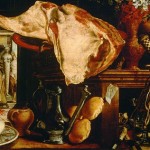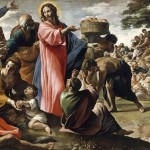 “Son, go work today in my vineyard,” our Father says to us (verse 28).
“Son, go work today in my vineyard,” our Father says to us (verse 28).
God has planted us in His garden, His Kingdom, and He has called each of you to go and work in His vineyard today. It’s a wonderful thing to be planted in God’s garden. It’s a place filled with every kind of fruit that is good to the eye, good to the tongue, and good to the stomach. It’s a place of unparalleled beauty and joy, and you have been placed in it.
But, having tasted the fruits of God’s garden and beheld its joys, you’re expected to contribute to the good of God’s garden and be a participant in its goodness and bounty. It’s something that’s there for your enjoyment, but only to the degree that you invest yourself in it and labor together with others for the common good and the glory of God. It does not belong to you but to God. It is a garden, and not a self-governing wild orchard. It needs to be tended, or else it will return to weeds and unfruitfulness.
Israel, too, was the garden of God. It was a land flowing with milk and honey, and the Israelites were God’s peculiar people, chosen by Him to keep His land. But throughout their history they played the part of the second son, the one who said he would obey the Father and go and work in the vineyard but in reality refused to. At this point in Matthew 21, Jesus is still speaking to the chief priests and the elders of the people, who had just confronted Him about His teaching and authority. The place where they did this was in the temple, the house of God, which could also be seen as the garden of God.
And so Jesus is warning them that although they speak as if they are obeying the Father, they are actually not. The tax collectors and harlots will enter God’s kingdom and garden before the chief priests and elders, for although they initially disobeyed, in time they repented and obeyed.
There’s a lesson for each of us here. At various times in our lives, at various times in our day, we may be acting more like the first son, who said he would not obey but did, or the second son, who said he would go but in the end does not.
Aren’t there times when, acting like the second son, we’ve said to the Lord that we will gladly die for Him and move mountains for Him, but when He asks us to clean the latrine or forgive our brother or give up our unit of pleasure for another person, we balk. We have a habit of professing our love boldly for God and then continuing to go on our merry way as if we had not just promised God the moon and the sun.
It can even become like this in that most special of occasions: Sunday morning worship. We may say to ourselves that we go to worship God, but on some Sunday mornings we may not feel like being there. We say that we will establish a holy time each day for God when we can be alone with Him, but when that time comes and the morning is too early or there are too many things to be done or the evening comes and we are in leisure mode, we miss our appointment with God. We hear the voice of God tell us exactly what He wishes for us to do next, and we say, “Yes, Lord,” and then fail to do what He’s just told us and what we just vowed to do.
But aren’t we also like the first son? Aren’t there times when we initially refuse God? We get stuck in our bad habits or patterns and, in a quiet way, refuse the pleading of the Spirit in our lives. We lack faith and refuse to leave our warm, fuzzy cocoon when God calls us out to the adventure of the butterfly. And then, hopefully, at some point, we realize the error of our ways, and we repent.
And that’s the difference between the first and second son, isn’t it. Their refusal to obey the Father is what the two sons have in common. But what separates the first and blessed son from the second and cursed son is the place they end up. In our lives, taken as a whole, no matter where we begin, there are only two places we’ll end up: in faith and obedience to our heavenly Father, or in pride and disobedience to our heavenly Father.
In our daily lives it’s the same thing. Sadly, we will continue to sin in this life. That’s an unpleasant fact. But what distinguishes whether or not we’re acting like the first or second son is whether or not we repent. Even the thief on the cross, at the hour of death, had one final chance to repent, no matter what else he had done before. Whether you’re hired first thing in the morning or work only the last hour in God’s kingdom, the wages are the same: the important thing is to step forward and begin laboring in His garden.
Actually, there’s a third, invisible son in the story. He reminds me of my long lost brother Hector. You see, my Dad used to tell my twin brother and I that we were actually triplets and that we had another brother named Hector, who now worked as an elevator operator, I think at Elmhurst hospital: I’m not sure: I lost track of him in the 1960s. (So you see that I come by my weirdness naturally!) This third son is the one who says to the Father “I will obey,” and then actually obeys.
Regardless of which of the sons you are today, the point for all of us is the same: listen for the voice of your Father today, and when He speaks, obey. This is the way of the third son Jesus Christ, the Son (who really is my long, lost brother), and all who follow Him in the path of cheerful obedience.
Prayer: Our Father, who art in heaven, hallowed be Thy name. Thy kingdom come. Thy will be done, on earth as it is in heaven. Give us this day our daily bread. And forgive us our trespasses, as we forgive those who trespass against us. And lead us not into temptation, but deliver us from evil. For thine is the kingdom, and the power, and the glory, for ever and ever. Amen.
Point for Meditation: What has the Father been asking you to do lately? How have you been responding?
Resolution: I resolve to listen for the one thing my Father is asking me to do today. I further resolve to say “I will” and to obey when He speaks to me today.
Worker in Vineyards – Creative Commons Attribution 2.0 Generic license












